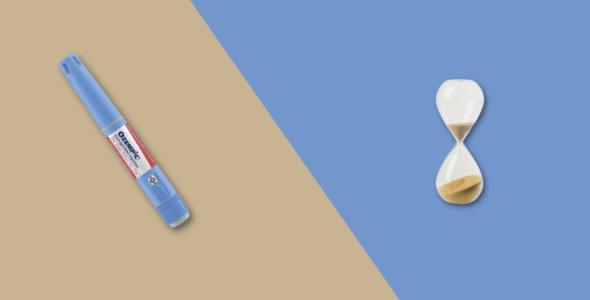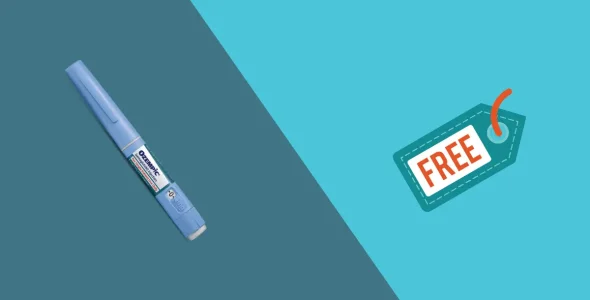Top natural alternatives to Ozempic
Key highlights
- Natural alternatives to Ozempic like berberine, psyllium husk, and pomegranate extract can support blood sugar control and weight loss, but results may vary.
- GLP-1 supplements and other plant-based options may mimic Ozempic’s effects, helping with insulin sensitivity and appetite control.
- Consult a healthcare provider before switching from Ozempic to natural alternatives to ensure safety and avoid potential risks.
- Natural supplements may be gentler and more affordable but usually take longer to show results compared to prescription medications like Ozempic.
Ozempic (semaglutide) is an FDA-approved glucagon-like peptide-1 (GLP-1) receptor agonist that helps control blood sugar and improve insulin sensitivity in people with type 2 diabetes. It also aids in weight loss by reducing appetite and making you feel fuller longer.
Like any medication, semaglutide has some risks. Some people may experience nausea, constipation, or mild stomach issues, and others may regain weight after stopping the drug.
People may turn to natural alternatives to Ozempic for various reasons. A key factor is cost, as Ozempic can be expensive, particularly without insurance coverage. Some individuals prefer holistic or natural options, feeling more comfortable with plant-based remedies or those that are less chemically processed.
Let’s explore why Ozempic is so popular and examine research-backed natural options, including GLP-1 supplements, as well as other pharmaceutical and over-the-counter alternatives for your weight loss journey.
What are the best natural alternatives to Ozempic?
Natural alternatives are plant-based and help manage blood sugar while supporting weight loss without relying on prescription medications.
Natural alternatives support blood sugar and weight management by focusing on improving how the body processes and uses sugar. They often work by enhancing insulin sensitivity, which helps the body use insulin more effectively to control blood sugar levels.
Some methods also slow down sugar absorption, preventing blood sugar spikes after meals. These alternatives can help reduce cravings, improve metabolism, and promote fat burning, which supports weight loss.
Your doctor can guide you on the best approach to manage your blood sugar and weight in a way that works for your wellness.
GLP-1 supplements
GLP-1 supplements are natural compounds that act like a hormone your body naturally makes. This hormone helps control blood sugar by increasing insulin and stopping the release of glucagon. It also slows down how fast food leaves your stomach, helping you feel full longer, which can support sustainable weight loss. GLP-1 supplements are not reviewed or approved by the FDA and there’s no evidence that they work. Kourtney Kardashian’s supplement company, Lemme, recently launched a GLP-1 supplement called GLP-1 Daily which includes the ingredients red-orange fruit extract, saffron extract, and lemon fruit extract.
Berberine
Berberine, a natural compound found in plants like European barberry, Phellodendron, tree turmeric, and Oregon grape, is known to improve insulin sensitivity and lower blood sugar. It works similarly to GLP-1 medications by boosting metabolism. While clinical trials on its ability to reduce appetite and promote weight loss are still growing, studies show it may help with weight loss and reduce waist circumference. However, it is important to consult with a healthcare provider for the right dosage and to avoid potential side effects.
A study on people with metabolic syndrome showed that berberine improved insulin resistance and reduced waist circumference.
In another study, berberine showed similar results to metformin in improving blood sugar control. To get the best results, patients should take about 1.5 grams of berberine per day.
Although research on its weight loss benefits is still growing, studies suggest berberine may help with weight loss and reduce waist size. It is important to consult a healthcare provider for the right dosage and to avoid side effects.
Chromium
Chromium can help improve blood sugar control and insulin response, supporting better diabetes management and weight loss. However, it is important to use it carefully if you’re taking other medications or have health conditions. Chromium is also found in foods like broccoli, green beans, whole grains, turkey, grapes, and tomato juice.
Taurine
Taurine is a compound that helps improve overall metabolism by supporting healthy cholesterol and insulin levels. This can contribute to better weight management and metabolic health.
To naturally boost your taurine intake, you can include foods like shellfish, dark meat poultry, beef, pork, veal, tuna, tilapia, and shrimp in your diet. These foods are rich in taurine, which may help support your body’s metabolic processes and promote better overall health.
Resveratrol
Studies suggest that resveratrol, an antioxidant, may help with weight loss in people with obesity by reducing fat mass and improving body composition. It can also support overall health by protecting cells from damage.
You can find resveratrol in foods like grapes, cranberries, peanuts, pistachios, and dark chocolate. Including these foods in your diet may offer benefits for weight management and contribute to better metabolic health. However, more research is needed to fully understand its effects.
Aloe vera
Aloe vera, often praised for its skin-healing properties, also offers several health benefits, including potential support for weight management.
Its supplements may help lower blood sugar levels, improve cholesterol, and reduce body fat percentage. This makes it a promising natural option for managing blood sugar and cholesterol.
A 2015 review of studies found that aloe vera gel can help promote healthy cholesterol, reduce body weight and fat, lower blood sugar, and improve insulin resistance in obese patients with prediabetes.
However, it is important to use aloe vera supplements with caution, as they can cause side effects and may impact insulin resistance or cholesterol levels.
Magnesium
Magnesium is an important mineral that supports many functions in the body, including energy production and improving insulin sensitivity. This makes it helpful in regulating metabolism and controlling blood sugar levels.
Magnesium supplements have been linked to lower BMI and improvements in metabolic syndrome. You can get magnesium from foods like leafy greens, nuts, seeds, beans, tofu, and whole grains.
While magnesium is generally safe, it can sometimes cause stomach issues like diarrhea or discomfort, especially in supplement form. Before adding magnesium to your diet, it’s a good idea to consider your gut health to avoid any potential digestive problems.
Pomegranate
Pomegranate extract has gained attention as a natural supplement that helps boost GLP-1, a hormone that plays a key role in regulating blood sugar and controlling appetite.
Pomegranate extract can boost GLP-1 secretion, helping with blood sugar control and weight management. Drinking pomegranate juice may also reduce insulin resistance and improve blood sugar, but it’s important to choose juice without added sugar.
Adding pomegranate to your diet can be a tasty and natural way to help control blood sugar and manage weight. Whether as fresh fruit, juice, or extract, it can support other health strategies for those looking for alternatives to traditional medications.
Tumeric
Turmeric, especially its active compound curcumin, has been studied for its ability to help regulate blood sugar and improve insulin sensitivity, making it a potential natural alternative to Ozempic.
Its anti-inflammatory properties may support overall metabolic health, helping to control blood sugar levels and reduce the risk of insulin resistance.
Including turmeric in your diet, along with a healthy lifestyle, could be beneficial for blood sugar management.
Psyllium husk
Psyllium husk, often called the “poor man’s Ozempic,” is an affordable fiber supplement that helps you feel full and supports weight management.
It may also help with healthy cholesterol levels. While more research is needed, its ability to promote satiety and aid in minor weight loss makes it a promising natural alternative for those looking for a cost-effective solution.
Diet and exercise
Combining a balanced diet with regular exercise can help promote weight loss and blood sugar control.
The Mediterranean diet, which emphasizes whole foods like fruits, vegetables, nuts, olive oil, fish, and legumes, is rich in nutrients and healthy fats that promote heart health and reduce inflammation. Similarly, plant-based diets focus on vegetables, whole grains, and legumes, provide fiber and antioxidants to stabilize blood sugar and support weight loss.
Combine these healthy dietary choices with regular physical activity, such as walking, strength training, or yoga, to enhance metabolism, improve insulin sensitivity, and achieve sustainable results.
Is there an OTC alternative to Semaglutide?
There is no over-the-counter (OTC) alternative to semaglutide. Semaglutide is a prescription medication used to manage blood sugar and support weight loss. While some natural supplements may help with blood sugar control and weight management, they are not as strong or proven as semaglutide.
For those who are looking for something milder, here are some OTC alternatives to Ozempic:
- PhenQ: A natural weight loss supplement that suppresses appetite and boosts metabolism to burn more calories.
- Phen24: A two-part system with day and night formulas. The night formula helps prevent late-night cravings and boosts fat burning.
- Zotrim: An appetite suppressant known for long-lasting weight loss results.
Always consult a healthcare provider for medical advice before trying these alternatives.
Pharmaceutical alternatives to Ozempic
Pharmaceutical alternatives to Ozempic are medications that work in a similar way to help manage blood sugar levels and promote weight loss. These weight loss medications are known for their potential benefits, including improving insulin sensitivity, suppressing appetite, and boosting metabolism.
If you’re looking for safe, long-lasting weight loss drugs without semaglutide, pharmaceutical options may be helpful.
Here are some of the best alternatives to semaglutide:
Metformin
Metformin, also known by the brand name Glucophage, is a medication that belongs to the drug class biguanides used to manage blood glucose levels. It helps lower blood sugar by improving insulin sensitivity. It is also known for reducing cholesterol levels and promoting heart health.
Common side effects include stomach issues like nausea, vomiting, gas, and discomfort.
Phentermine
Phentermine, also known by the brand name Adipex, is a popular ingredient in several appetite suppressants including Qsymia and Lomaira. It helps with weight loss by reducing appetite and balancing neurotransmitter (chemical signals) levels in the body.
Bupropion
Bupropion, also known by the brand name Wellbutrin, is often used to help quit smoking and treat depression by balancing dopamine and norepinephrine levels. These chemicals play a role in mood and appetite control.
Unlike many antidepressants, which are linked to weight gain, bupropion can lead to weight loss, with some patients losing up to 10% of their body weight.
Liraglutide
Liraglutide is a GLP-1 receptor agonist like semaglutide that helps control blood sugar and aids in weight loss in overweight or obese people. It is available under brand names Saxenda (for weight loss) and Victoza (for diabetes).
Liraglutide is an injectable medicine that makes you feel full after eating less, which helps reduce calorie intake and body weight.
Dulaglutide
Dulaglutide, also known by the brand name Trulicity, is a GLP-1 receptor agonist that helps improve blood sugar levels in people with type 2 diabetes. It Is also used for people with type 2 diabetes that are unresponsive to other treatments, sometimes with other diabetes medications like metformin or insulin.
Exenatide
Exenatide, also known by the brand name Byetta, is an injectable medication used for type 2 diabetes. It also aids in weight loss by increasing feelings of fullness and decreasing food intake. It is available in two forms: a fast-acting version taken twice daily and a slow-release version taken weekly.
Exenatide is commonly prescribed when other medications aren’t effective and is often used alongside diet, exercise, and sometimes other diabetes medications for better results.
Tirzepatide
Tirzepatide, also known by the brand names Mounjaro and Zepbound, is a GLP-1 agonist like semaglutide, but it works better for most people because it targets both GIP and GLP-1 receptors, leading to more effective weight loss and blood sugar control.
It is taken weekly, but some patients may experience mild gastrointestinal side effects such as nausea, vomiting, and diarrhea.
Switching from Ozempic to a natural alternative
Switching from Ozempic to a natural alternative should be done carefully with guidance from a healthcare provider. Stopping Ozempic suddenly can cause blood sugar spikes and may lead to weight gain.
A healthcare provider can help create a plan for achieving a healthy weight by:
- Gradually reducing Ozempic while adding natural alternatives
- Monitoring blood sugar, blood pressure, and cholesterol
- Following a balanced diet with fiber, lean proteins, and healthy fats to manage appetite
Safety considerations for natural alternatives
Natural Ozempic alternatives can be helpful but come with potential risks. Monitoring blood sugar is especially important during the switch, as every individual might respond differently. For instance, berberine can cause low blood sugar if taken with diabetes medications and is not safe for pregnant or breastfeeding women or children.
It is crucial to monitor for any side effects and use natural alternatives carefully, always under the guidance of a healthcare provider.
How natural alternatives compare to Ozempic
Natural alternatives can help with blood sugar control and weight loss, but they usually don’t work as quickly or effectively as Ozempic.
Ozempic is specifically designed and clinically proven for faster, more consistent results in managing blood sugar and promoting weight loss.
Additionally, natural alternatives may take longer to show results and can vary in effectiveness from person to person. They often require lifestyle changes like diet and exercise to be effective, and they may not provide the same level of control as pharmaceutical options like Ozempic.
Frequently Asked Questions
Can natural alternatives completely replace medications like Ozempic?
Natural alternatives may help with blood sugar control and weight loss, but they can’t completely replace medications like Ozempic for everyone. Ozempic is a proven, prescription medication specifically designed to manage diabetes and aid weight loss effectively. Natural alternatives can support health goals, but they may not offer the same level of control or sustainable results.
How long does it take to see results with natural methods?
It can take a few weeks to a few months to lose weight with natural methods. The timeline varies depending on the person, the method used, and how well it’s combined with a healthy diet and exercise.
What is the best diet to combine with herbal supplements for maximum effectiveness?
A balanced diet with fiber-rich foods (fruits, vegetables, whole grains), lean proteins (chicken, fish, tofu), healthy fats (avocados, nuts, olive oil), and low in processed sugars works best with dietary supplements for maximum effectiveness.
Bottom line
Natural alternatives can help with blood sugar and weight loss, but they may not work as quickly or effectively as Ozempic.
Combining the right medication, natural alternatives, diet, and exercise, with continuous monitoring, will help achieve long-term success.
Always speak to a healthcare professional before making any significant changes to your health regimen to ensure safety and effectiveness.










